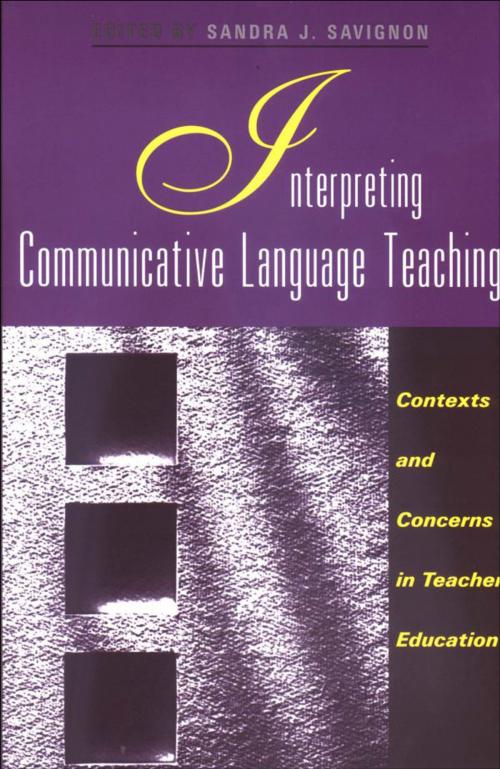Interpreting Communicative Language Teaching
Contexts and Concerns in Teacher Education
Nonfiction, Reference & Language, Foreign Languages| Author: | ISBN: | 9780300129076 | |
| Publisher: | Yale University Press | Publication: | October 1, 2008 |
| Imprint: | Yale University Press | Language: | English |
| Author: | |
| ISBN: | 9780300129076 |
| Publisher: | Yale University Press |
| Publication: | October 1, 2008 |
| Imprint: | Yale University Press |
| Language: | English |
The emergence of English as a global language, along with technological innovations and the growing need for learner autonomy, is changing language teaching rapidly and profoundly. With these changes come new demands and challenges for teaching education programs.
This authoritative collection of writings highlights some of the best work being done today in the United States and abroad to make communicative competence an attainable goal. The contributors examine what has come to be known as communicative language teaching, or CLT, from the perspectives of teachers and teacher educators.
The book documents current reform initiatives in Japan, the United States, Hong Kong, Taiwan, and continental Europe to provide a global perspective on language teaching for communicative competence. Four major themes recur throughout the volume: the multifaceted nature of language teaching; the highly contextualized nature of CLT; the futility of defining a native speaker” in the postcolonial, postmodern world; and the overwhelming influence of high-stakes tests on language teaching. The book is a useful and valuable tool for language teachers, teacher educators, and policymakers.
This authoritative collection of writings highlights some of the best work being done today in the United States and abroad to make communicative competence an attainable goal. The contributors examine what has come to be known as communicative language teaching, or CLT, from the perspectives of teachers and teacher educators.
The book documents current reform initiatives in Japan, the United States, Hong Kong, Taiwan, and continental Europe to provide a global perspective on language teaching for communicative competence. Four major themes recur throughout the volume: the multifaceted nature of language teaching; the highly contextualized nature of CLT; the futility of defining a native speaker” in the postcolonial, postmodern world; and the overwhelming influence of high-stakes tests on language teaching. The book is a useful and valuable tool for language teachers, teacher educators, and policymakers.
The emergence of English as a global language, along with technological innovations and the growing need for learner autonomy, is changing language teaching rapidly and profoundly. With these changes come new demands and challenges for teaching education programs.
This authoritative collection of writings highlights some of the best work being done today in the United States and abroad to make communicative competence an attainable goal. The contributors examine what has come to be known as communicative language teaching, or CLT, from the perspectives of teachers and teacher educators.
The book documents current reform initiatives in Japan, the United States, Hong Kong, Taiwan, and continental Europe to provide a global perspective on language teaching for communicative competence. Four major themes recur throughout the volume: the multifaceted nature of language teaching; the highly contextualized nature of CLT; the futility of defining a native speaker” in the postcolonial, postmodern world; and the overwhelming influence of high-stakes tests on language teaching. The book is a useful and valuable tool for language teachers, teacher educators, and policymakers.
This authoritative collection of writings highlights some of the best work being done today in the United States and abroad to make communicative competence an attainable goal. The contributors examine what has come to be known as communicative language teaching, or CLT, from the perspectives of teachers and teacher educators.
The book documents current reform initiatives in Japan, the United States, Hong Kong, Taiwan, and continental Europe to provide a global perspective on language teaching for communicative competence. Four major themes recur throughout the volume: the multifaceted nature of language teaching; the highly contextualized nature of CLT; the futility of defining a native speaker” in the postcolonial, postmodern world; and the overwhelming influence of high-stakes tests on language teaching. The book is a useful and valuable tool for language teachers, teacher educators, and policymakers.















